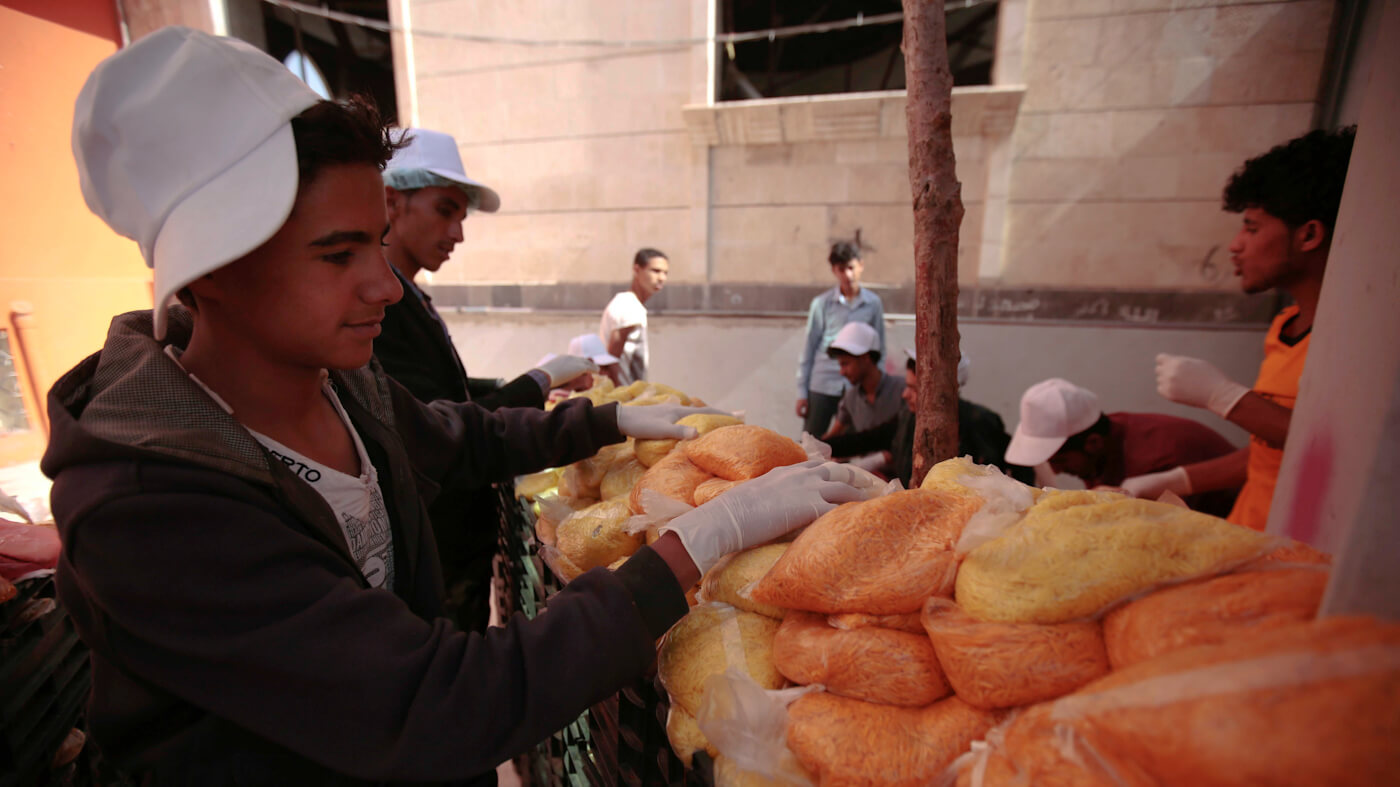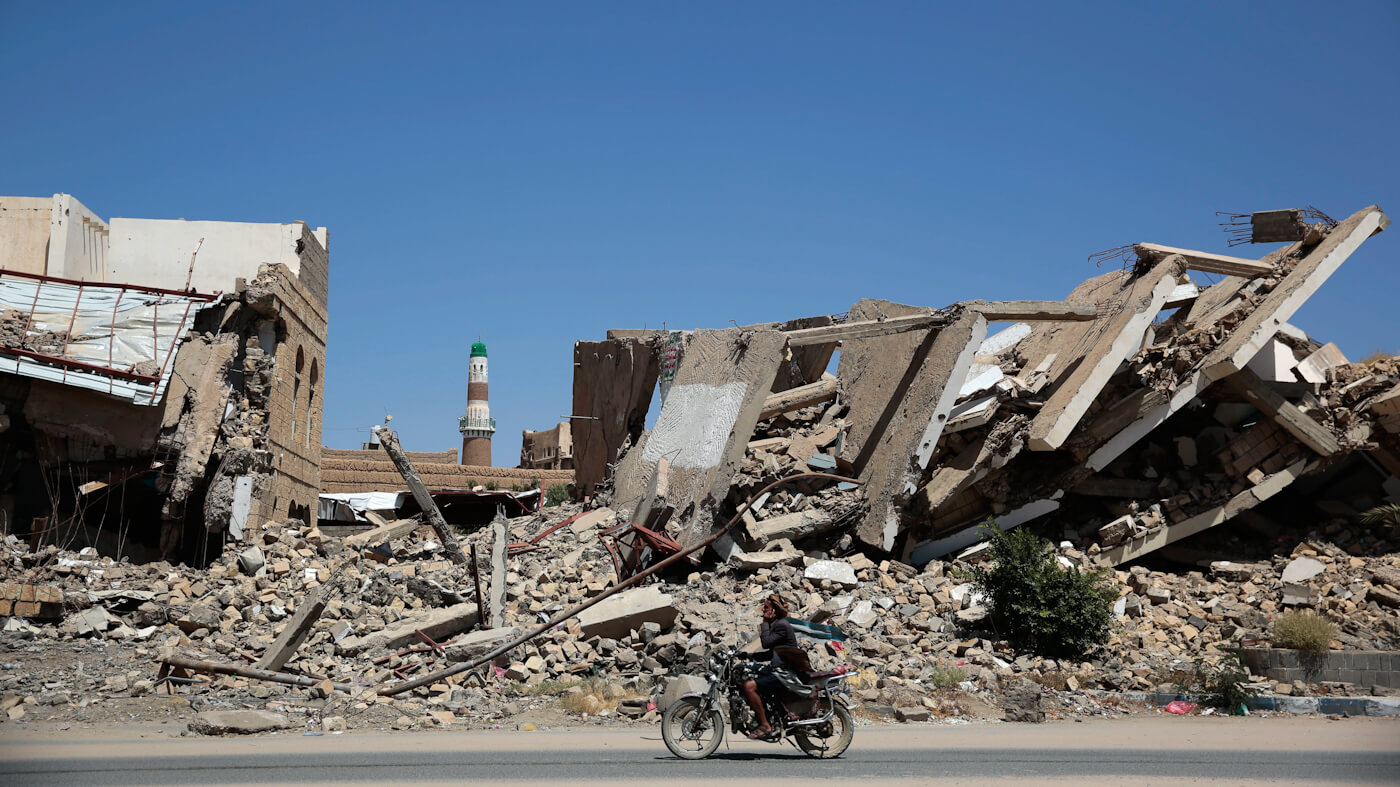SANA’A, YEMEN — Carrying a rosary in one hand and keying in items on a cash register with the other, Abd al-Karim al-Atimi stands in his small shop on Airport Street in Yemen’s capital city of Sana`a. His customers rarely pay in cash, instead relying on an honor system in which items are marked down to be repaid in later installments. “Sadly, just like in previous years, there has been no peace this Ramadan and the aggression against us still flourishes,” al-Atimi told MintPress News.
For the fifth year in a row, Ramadan in Yemen will be marked by the ongoing hunger of millions of people enduring a severe humanitarian crisis, a relentless blockade, and intense attacks by the Saudi-led Coalition. This Ramadan, 3.3 million people in Yemen are displaced and a staggering 24.1 million are in need of humanitarian aid.
Coalition warplanes have so far offered little reprieve to Yemenis during Islam’s holiest month, with several regions — including Hajjah, Hodeida, al-Beida, al-Dali, and Sana`a — under almost constant aerial bombardment.
Four civilians, including a woman and child, have already died from hunger in southern Hodeida during four days of Ramadan, and least 7,000 civilians who remain trapped in the district by Coalition forces risk starvation as well. Hodeida province’s al-Durayhimi district has been under siege for eight months, as civilians endure an acute shortage of food and supplies, and the spread of disease that inevitably accompanies it.
On Thursday, the Saudi-led Coalition prevented a large convoy of food aid and donations that were collected by fellow Yemeni civilians from being delivered to al-Durayhimi’s residents. “The situation is deteriorating in al-Durayhimi, and the Coalition is preventing the entry of aid to children, women, the elderly,” reported the National Commission for the Management and Coordination of Humanitarian Affairs and Disaster Response in Hodeida on Thursday.

Civilians across Yemen are keenly aware of the stark difference between Ramadan before and after the war. “Prior to the war, we used to have a peace of mind during Ramadan and focus on fasting and praying. Today, we struggle just to stay safe from airstrikes, snipers, artillery shells and missiles,” Ali Atta, a resident of the city of Hawk in Hodeida told MintPress.
Celebration dimmed by economic devastation
The continual violence is not the only thing making the lives of civilians difficult this Ramadan. The ongoing blockade of Yemen’s ports by the Saudi-led Coalition has caused the price of fuel and medicine to skyrocket and the Coalition’s freeze on Yemen’s Central Bank means that many Yemenis are no longer receiving a paycheck.
The war has changed the very way that people live. Al-Atimi, a university graduate with a pre-war degree in trade, said:
Before the war, the income from my grocery business was good because people were in good shape [financially], but now that salaries have been cut off, people barely can barely save enough for a single day’s expenses.”
Before the war began, Yemeni families would often prepare for Ramadan by saving throughout the year to buy enough food for the entire month. Today, many families are forced to beg on the streets for their daily meal.
“We wouldn’t be able to keep the store open if didn’t allow customers to buy groceries on credit. Most people don’t have enough to meet their daily needs this month,” al-Atimi said as a new customer arrived at his family grocery store. Forty-two-year-old Salim al-Saifi, who works as a teacher, bought a carton of milk and a few vegetables; he asks al-Atimi to add the items to the debt he already owes.
Al-Saifi, an elementary school science teacher at a government primary school, said that Ramadan has added new burdens as he struggles to pay for the traditional Ramadan meals that his family is accustomed to, and he doesn’t want his four daughters to feel deprived.
The war, which wreaked havoc on Yemen’s already fragile economy, has caused thousands in Yemen to lose their jobs, including 27-year-old Ahmed al-Qemali, who borrowed money to buy a motorcycle hoping to use it pick up fares in Sana’a. Ahmed used to work as a driver at a travel and tourism company but the office closed after the war began, leaving Yemen’s modest tourism industry in shambles.

Ahmed hopes he can eke out a living this Ramadan by giving people, often fatigued by fasting, rides through the over-congested streets of Sana’a, but he’ll be competing with thousands of other unemployed Yemenis who have the same idea.
According to Yemen’s Ministry of Social Affairs, over 5 million workers have lost their jobs since the war erupted, causing many local and foreign companies to cease their operations in the country.
Food aid expired and crawling with vermin
Ramadan is a holy month for Muslims across the world, marked by a daily fast from dawn to sunset, a deep contemplation of one’s relationship with God, and an increase in the amount of charitable giving. However, with basic needs in such short supply, for most Yemenis, Ramadan is about trying to survive.
The scant food aid provided by the United Nations, which millions of Yemenis rely on for their daily sustenance, often doesn’t reach people until it is already expired — by that time often crawling with worms and cockroaches. A lack of proper storage facilities, constant power outages and the difficulty of transporting aid via dangerous roads has hindered the ability of aid groups to reach those in need.
MintPress managed to reach four World Food Programme storage facilities, including Rebad al-Nahari in Reimah province in central Yemen; the al-Raheda district in Ta’ze province, where local authorities stopped three trucks carrying expired flour; the facility in Hajjah’s Abss district; and a storage facility in al-Ganawes, in Hodeida. This being Yemen, where food shortages are so acute, simply viewing the treasure trove of food aid felt almost subversive.
In Abss, the World Food Programme facility housed at least 21,400 bags of flour and canned food, almost all of it expired and corrupted by a weevil infestation. There are more than 5,000 displaced people in Abss, many of whom said they received none of the aid. The ones who did receive it said it was already expired and mostly unfit for human consumption.
Alan Fadouil, director general of the National Relief and Humanitarian Coordination Agency in Hajjah, said on Tuesday that “21,407 bags of flour and foodstuffs belonging to the World Food Programme were already expired due to poor storage.”
“We hoped that the food would be distributed to the displaced before it was expired,” Fadouil said. But residents say that, despite their pleas, officials often find excuses to withhold the aid.
“When we asked them to give us flour, they argued that the exchange process had not yet started. They always say there is some disagreement over the distribution system,” a displaced person told MintPress as he was standing outside a World Food Programme storage facility in Abss.
Some families, left with little choice, simply eat the expired food. “We have no other choice, we sift the weevil out of the flour and use it to make breakfast,” 32-year-old Aisha, a mother of three told MintPress. Expired boxes and cans of World Food Programme tuna and biscuits lined her shelves.
For its part, the World Food Programme said it has finally gained access to vital food stores from a facility on the outskirts of Yemen’s flashpoint city of Hodeida on Sunday, a month after postponing its mission to reach the aid for “security reasons.” However, the World Food Programme food stores viewed by MintPress were far from the front lines and could be accessed by the Programme at any time.
Feature photo | A displaced girl, who fled from fighting in Taiz, is seen during month of Ramadan in a slum on the outskirts of Sana’a,, Yemen, May 10, 2019. Photo | Reuters
Ahmed AbdulKareem is a Yemeni journalist. He covers the war in Yemen for MintPress News as well as local Yemeni media.

